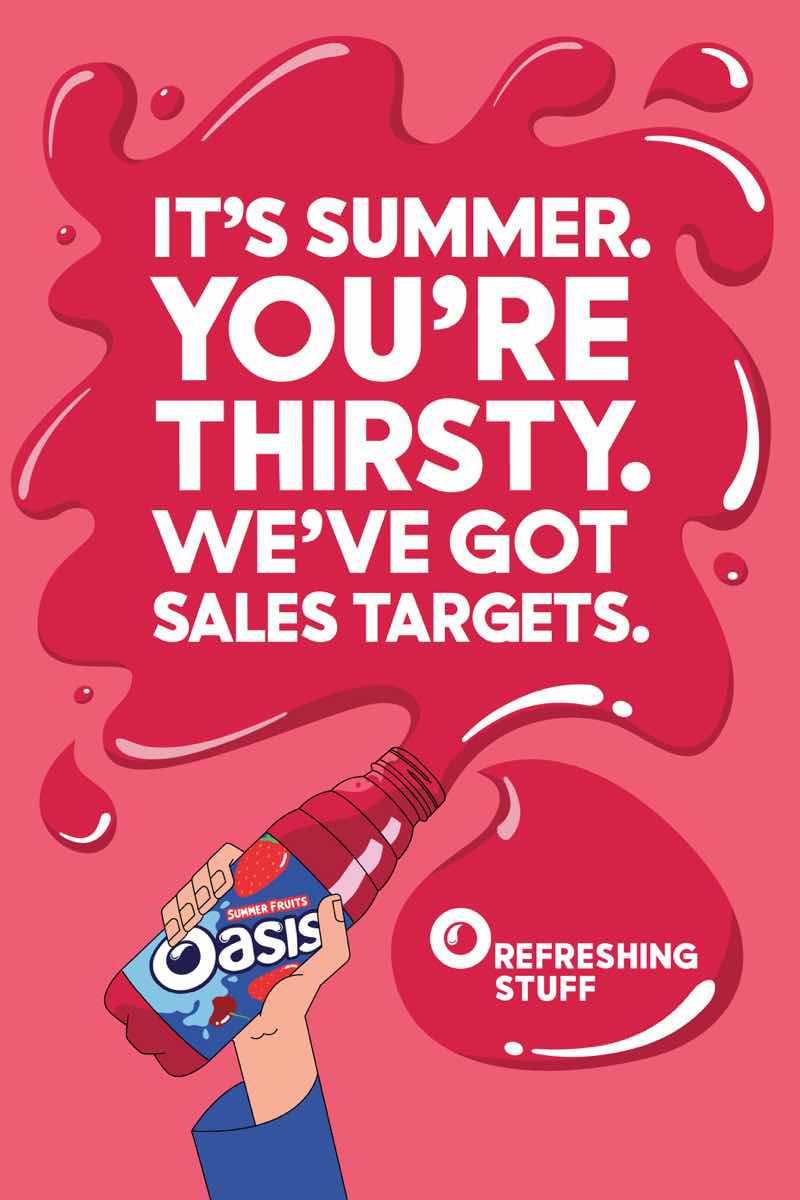 |
| Honesty Marketing at it's finest |
The history of Oasis is a little muddled. It was originally launched in 1966 by Volvic under the name 'Pulse', but poor sales led to its rebrand as 'Oasis' in 1990. Its history then gets a little complicated, but in essence it was acquired by the then Cadburys-Schweppes who launched it into the UK in 1995. It was then acquired by Coca Cola Enterprises in 2005 along with a number of other European drinks brands.
Oasis has been positioning itself as a "healthier soft drink" solidly for 20 something adults who are happy to pay premium prices for a relatively standard purchase - in this case, squash from concentrate. By suggesting itself as an alternative to water rather than something like Coke, it links the brand to healthy options and positions itself firmly in the health category.
They also have access to a lot of the Coca Cola distribution network; if somewhere sells Coke, they are likely to sell Oasis and include it in their deals.
There were product problems that needed fixing when CCE acquired it: Oasis used to have a heavy sugar content which meant it failed originally as a healthy option. This was eventually sorted by reconfiguring the recipes, but there were several false starts on the way with low calorie versions such as 'Fusion', 'Lights' and 'Extra Lights' which, despite over £3m launch spend in marketing, were withdrawn quickly afterwards due to bad sales.
So far, so good.
However, Oasis does have a problem in that it's never quite seemed to manage to fix its brand image
 |
| The ill-fated and pulled Cactus Kid campaign |
Still, CCE isn't going to abandon Oasis to its fate. The global soft drinks business is falling as people look for healthier options; soda consumption globally is now equivalent to what it was in 1986 having been falling steadily since 2005. In additional, Coca Cola has been targeted specifically by health groups such as the CSPI in Amercia (the Center for Science in the Public Health) partly due to its high profile and market share. To counterbalance, CCE has been adding non-soda companies to its portfolio in the last 7 years to try and diversify their risk, including investing in 5 smaller companies and buying 3 more. It owns companies like Glaceau (who make SmartWater), Fuze tea, Zico coconut water and Honest Organic tea. Even the flagship brand itself is feeling the pressure by releasing new formulations such as Coke Life which replaces sugar with sevia, although this still hasn't been launched in the US to date.
Oasis, as a brand in the right place at the right time is a potential goldmine, if they can just get the right messaging.
The latest campaign has been created by 'The Corner' agency, and have gone into what is called 'insane honesty marketing' and 'humanised marketing' (thanks to Cuco Creative for the terms and some of the info in the next couple of paragraphs). It's a big change from some of the glitz and style that they've delivered previously.
This shift is designed to appeal to millennials; i.e. people who reached adulthood around 2000, so will now be in their 30s and who value transparency and honesty in the communications from big brands rather than slick presentations. So Oasis are changing their emphasis slightly from 20s to 30s: not something they would do lightly and without a lot of consumer research. The Pioneers of this sort of thing were companies like Innocent with their smoothies and vegetable pots. It's also notable in companies that actively engage in social media, especially those that have a distinct personality and human voice.
The ultimate payoff of this strategy is trust: if a brand is willing (or at least seen as being willing) to be open about their weaknesses, then when they talk about their strengths, the listener is far more likely to believe them. It's a known phenomenon known as the Halo Effect.
The likelihood is that this campaign will be more successful than their previous ones, and this time they are looking at a segment with more disposable income and more health-consciousness. They are also more likely to have children, and so be under more social pressure to provide healthy options for lunches and outings. My guess is that the next push is likely to focus on health benefits, which will be more believed than previous claims after this initial bout of honesty. So my feeling is that yes, it will work, as long as they can maintain whatever claims they make and continue with the human messaging.
I'll be interested to see how it goes!
No comments:
Post a Comment